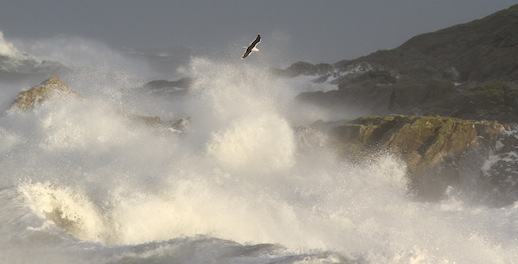Words: Jon Gower
What seems, nowadays to be fiefdom of the wind, an island in its blustery thrall, used to be its own kingdom with its own ruler. Enlli was once owned by Lord Newborough and he and his wife Maria Stella would graciously visit and distribute ribbons for islanders to wear in their hats. The same largesse led to them bestowing the place with a crown – albeit not one of solid gold.
The full origins of the tradition are lost in the fog of time, but a letter from one of Lord Newborough’s workers suggests that one king died in 1826, although the first named incumbent was one John Williams who drifted from this life in 1841, the day after his son John Williams II was born, too swiftly inherit the title. Crowning ceremonies – the crown itself was made of tin – were reputedly held at the Narrows, the little isthmus between the two principal parts of the island. They apparently involved a little silver snuff box, with the man-who-would-be-king standing on a chair for the ceremony.
The most famous member of the royal succession was Love Pritchard whose reign over the island included the great, sad exodus of the 1926 when he himself took pictures of the little flotilla of boats taking people away from their island homes, at a time, coincidentally when other islands, such as the Aran islands, were similarly being depopulated. By that time the lack of young men on Enlli was a matter of concern, for as the King told the Daily Sketch for an article called Life Too Dull: Why Bardsey is being deserted: ‘We have not enough men to row boats off for us and look after the cattle.’ The mainland attractions of cinema and wireless seduced the young men, who couldn’t wait to leave. He looked every inch the king, with his flowing Neptune beard and bardic locks of hair. Artist Brenda Chamberlain, in her haunting memoir of island life, Tide-race penned a briny vignette as she recalled her first regal encounter:
He had a light metal crown chased with a design of seahorses and shells, worn slightly side-ways on his head, and in his crab-like fingers he held a plug of twist from which he was cutting thin wafers of tobacco. By his side lay an empty rum bottle. He was gross with majesty, and must have been a good trencherman and a heroic drinker. He reeked of fish and salt and tarry ropes.
Another writer, the south African poet Roy Campbell, became the King’s ‘chief adviser concerning his home policy: and cheating the tax collector’ and recalled him as a strong man who, even in his eighties ‘could pick up a sack of flour with one hand and lay it over his shoulder as if he was a feather.’ The king has gone, so too the crown, which lies indecorously in a storage drawer in a Liverpool museum: Bardsey’s Elgin Marbles.
Despite the strengthening gusts the little cove at Solfach – protected by a curve of sandy banks – is tranquil, with rock pipits animatedly needling among the seaweedy jetsam for sandhopper hors d’oeuvres. Where they prog and pick there are plastic drinks’ bottles newly washed ashore, a reminder of human profligacy even in this seemingly pristine and untouched place.
But stuff washed ashore, flotsam, or broc môr as its known hereabouts, can have its uses, and wood in particular has been an invaluable commodity. The Life of Elgar recounts how the sea offered up its bounty to a starving Enlli hermit in the shape of a freshly dead stag to grace an ascetic’s simple barbeque, his fire and complementary stick. In the early nineteenth century islanders tasted oranges and lemons for the very first time after a vessel from the Azores ran aground and shed its ascorbic cargo. Once someone on Enlli found a complete lifeboat, which they kept to use as a, well, lifeboat and in some of today’s island homes there are articles of furniture, even the occasional chaise longue, built simply from driftwood and patience. Competition for wood for the fire or for fencing was often fierce and R. M. Lockley would often find islanders prowling in the half light as he returned from a vigil at the lighthouse: “There is a wonderfully healthy competition in the hunt for driftwood, in which the rule is that the first man to throw a plank on the greensward gets it. Anything larger than a pencil is eagerly snapped up.”
